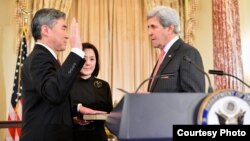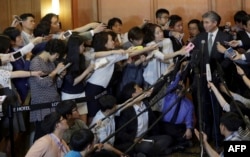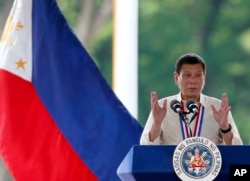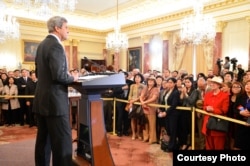A soft-spoken veteran U.S. diplomat with considerable experience facing the North Koreans has been handed what may be his most challenging assignment: ambassador to the Philippines — a longtime defense treaty partner whose leader has announced a "separation" from the United States.
Sung Kim was sworn in Thursday at the State Department by Secretary of State John Kerry, who downplayed the rapidly deteriorating environment, saying he remains confident about the bilateral relationship "notwithstanding a difference here or there about one thing or another."
The secretary of state also announced he would like to visit the Philippines again before he leaves his post.
Philippines President Rodrigo Duterte has not only spurned Washington, but he launched obscenity-laced insults at President Barack Obama and departing ambassador Philip Goldberg, announced an end to joint military maneuvers with the U.S., and initiated a strategic pivot from Washington to Beijing.
The Chinese quickly rewarded Duterte with $9 billion worth of low-interest loans and pledged to allow Filipino fishermen back in contested waters.
Kim's experience
Kerry noted the career diplomat "has even done battle with radioactive nuclear material" — a reference to one of Kim's 12 trips to North Korea when his shoes were contaminated during an inspection of a nuclear facility there.
Cleansing the toxic relationship with the Philippines, however, will prove more complex than a replacement of footwear.
Kim, a former special envoy for denuclearization talks with North Korea and subsequently ambassador to his native South Korea, is regarded as brilliant and calm, as Kerry pointed out Thursday. While behind the scenes he is a firm negotiator and blunt in characterizing a situation, he comes off as shy and somewhat ill at ease in public speaking and interacting with the media.
One of Kim's strong points, according to Kerry, "is that he goes into difficult meeting after difficult meeting, looking as if he had just gotten out of the lotus position."
One of his predecessors as envoy to the Philippines during the tumultuous era of the dictatorial kleptocracy of President Ferdinand Marcos contends, "Sung Kim's personality might be quite nicely suited" to the job at this juncture.
Human rights
Michael Armacost, speaking to VOA News, also said the new American envoy to Manila should "be a little patient" and avoid criticizing Duterte's controversial war on drugs. Since taking office four months ago, 4,700 people have been gunned down by police and vigilantes in the Philippines.
"The killings, for which few details are known and no efforts are made at accountability, have been a profound setback for human rights and the rule of law in the Philippines," according to Human Rights Watch.
The State Department declines to confirm reports that the U.S. commercial sale of 26,000 assault rifles to Philippines law enforcement has been halted amid concerns about the killings.
U.S. officials in public also have downplayed Duterte's quick embrace of Beijing, saying the strategic and trade relationship should not be viewed as a zero-sum game. Armacost — who is the Shorenstein APARC Distinguished Fellow at Stanford University — and some other longtime Philippines watchers are optimistic about the course of the relationship.
The common interests between America and its former colony cannot quickly or easily be replaced with a Chinese embrace, they argue, notwithstanding a quarter of Filipinos able to trace some of their ancestry to China.
Strong ties
The deep connection with America for the average Filipino is quite current and lucrative: 4 million Filipinos live in the United States and 30,000 are on active duty in the U.S. military. Remittances from Filipinos in the United States total about $10 billion dollars annually — the largest single amount from any country and nearly a third of all such funds flowing into the Philippines from overseas.
"I felt a lot of love in Manila but not from everyone," said Assistant Secretary of State for East Asian and Pacific Affairs Daniel Russel, who recently held talks in Manila with government officials there. "An independent foreign policy is no more, no less what we expect from any partner. It doesn't mean we're at odds."
Russel declined to say whether he found a disconnect between Duterte's rhetoric and Philippines government officials.
"It's not for me to handicap the internal dynamics of the Philippines government," he told reporters. "We seek to get things done with the Philippines that are of value to them."
The freshly sworn-in Ambassador Kim, in keeping with protocol at Thursday's ceremony and characteristic of his subdued public persona, made no note of the tension between Manila and Washington in his remarks, saying nothing more direct than "I am eager to get started" and vowing "the U.S. and the Philippines are and will continue to be close friends, partners and allies."
Kim instantly received his first brush-back from Filipinos when he greeted those attending the ceremony by mispronouncing the traditional Tagalog greeting mabuhay as "mah-boo-hay."
The crowd corrected him, loudly replying in unison: "mah-boo-hai."









